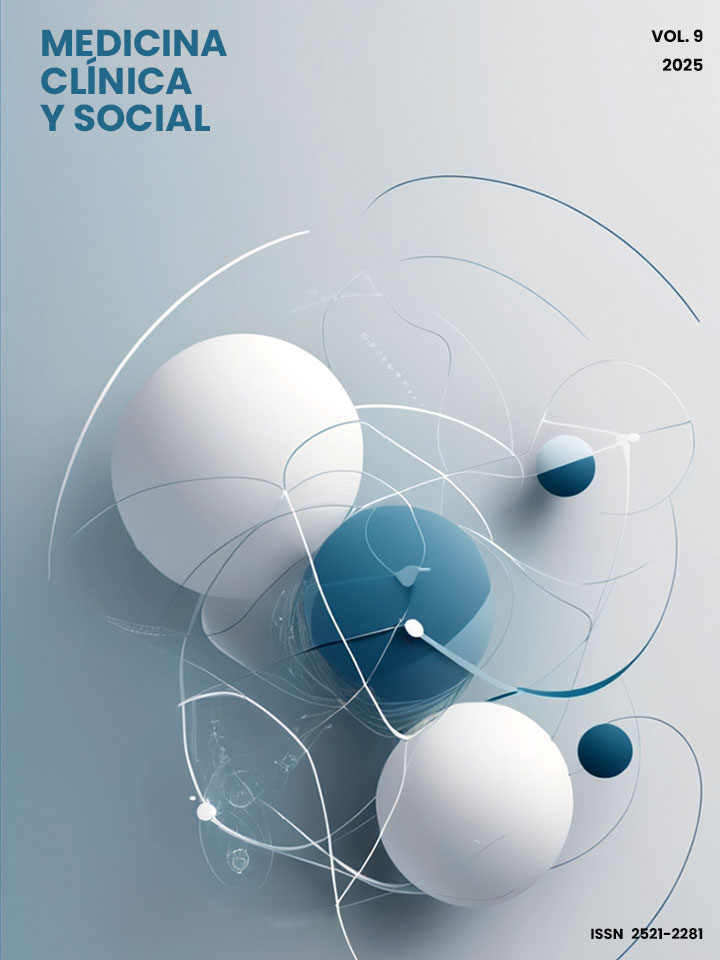Hantavirus in pediatrics: Three forms of presentation
DOI:
https://doi.org/10.52379/mcs.v9.541Keywords:
Hantavirus, Síndrome cardiopulmonar, Fiebre hemorrágicaAbstract
The Hantavirus genus, which belongs to the Bunyaviridae family, is a virus transmitted by aerosolization of feces from infected rodents belonging to the Muridae family. This virus can cause two types of conditions: hemorrhagic fever with renal syndrome (HFRS) and hantavirus pulmonary syndrome (HPS). Knowing the different types of presentation is important for the therapeutic approach. Three pediatric cases of hantavirus disease, confirmed by specific IgM, with different presentations and evolutions, are presented, with the intention of alerting about the pathology and forms of presentation. All cases come from an endemic area for hantavirus, in Paraguay. Case 1: pulmonary syndrome: schoolchild with fever, cough, respiratory distress, interstitial pneumonia, decreased oxygen saturation. Admitted to intermediate care room, with oxygen and support measures. Good evolution and discharged after 7 days. Case 2: Cardiopulmonary syndrome: Preschooler with cough, dyspnea, arterial hypotension. 90% O2 saturation. Admitted to ICU, ARM, with pulmonary hypertension, with antibiotics until serology and cultures return. Discharged after 6 days Case 3: Hemorrhagic fever with renal syndrome: Older infant patient, with history of fever, general malaise. Admitted with generalized purpuric lesions, edematous, hypotensive, stuporous. With progressive acute renal failure. No response to supportive treatments. Died on day 7. The disease caused by hantavirus can have various expressions and can be fatal. The origin of the patients must be taken into account and included in the differential diagnoses.
Downloads
References
1. Mocanu A, Cajvan AM, Lazaruc TI, Lupu VV, Florescu L, Lupu A, Bogos RA, Ioniuc I, Scurtu G, Dragan F, Starcea IM. Hantavirus Infection in Children-A Pilot Study of Single Regional Center. Viruses. 2023;15(4):872. https://doi.org/10.3390/v15040872.
2. Chaparro J, Vega J, Terry W, Vera JL, Barra B, Meyer R, et al. Assessment of person-to-person transmission of hantavirus pulmonary syndrome in a Chilean hospital setting. J Hosp Infect. 1998;40:281–5. https://doi.org/10.1016/s0195-6701(98)90304-8
3. Martinez VP, Bellomo C, San Juan J, Pinna D, Forlenza R, Elder M, Padula PJ. Person-to-person transmission of Andes virus. Emerg Infect Dis. 2005 Dec;11(12):1848-53. https://doi.org/10.3201/eid1112.050501
4. Ferrés M, Martínez-Valdebenito C, Angulo J, Henríquez C, Vera-Otárola J, Vergara MJ, Pérez J, Fernández J, Sotomayor V, Valdés MF, González-Candia D, Tischler ND, Vial C, Vial P, Mertz G, Le Corre N. Mother-to-Child Transmission of Andes Virus through Breast Milk, Chile1. Emerg Infect Dis. 2020;26(8):1885-1888. https://doi.org/10.3201/eid2608.200204
5. MacNeil A, Ksiazek TG, Rollin PE. Hantavirus pulmonary syndrome, United States, 1993-2009. Emerg Infect Dis. 2011;17(7):1195-201. https://doi.org/10.3201/eid1707.101306
6. Riquelme R, Rioseco ML, Bastidas L, Trincado D, Riquelme M, Loyola H, Valdivieso F. Hantavirus pulmonary syndrome, Southern Chile, 1995-2012. Emerg Infect Dis. 2015;21(4):562-8. https://doi.org/10.3201/eid2104.141437
7. Johnson AM, Bowen MD, Ksiazek TG, et al. Laguna Negra virus associated with HPS in western Paraguay and Bolivia. Virology. 1997;238(1):115–127. https://doi.org/10.1006/viro.1997.8840
8. Saúl PA, Sánchez-Cunto M, Gregori-Sabelli RA, Chacón NR, Chediack V, Cunto ER. Controversias sobre el uso de corticoides en el síndrome cardiopulmonar por hantavirus. Medicina (B Aires). 2021;81(4):617-623. URL
9. Cherry JD, Harrison GJ, Kaplan SL, Hotez PJ, Steinbach WJ. Feigin and Cherry’s Textbook of Pediatric Infectious Diseases. 8th ed. Elsevier; Amsterdam, The Netherlands: 2019. “Hantaviruses.” Essay. 1854–1865.
10. Torales Martha, Martínez Bettiana, Román Judith, Rojas Karen, Egea Viviana de, Torres Julio et al . Actualización de áreas de riesgo y perfil epidemiológico de hantavirus en Paraguay (2013-2020). Mem. Inst. Investig. Cienc. Salud. 2022; 20(3):108-116. https://doi.org/10.18004/mem.iics/1812-9528/2022.020.03.108
11. MINISTERIO DE Salud Pública y Bienestar Social. Paraguay. 2024. URL
12. Terças-Trettel ACP, Melo AVG, Bonilha SMF, Moraes JM, Oliveira RC, Guterres A, Fernandes J, Atanaka M, Espinosa MM, Sampaio L, Ueda SK, Lemos ERS. Hantavirus pulmonary syndrome in children: case report and case series from an endemic area of Brazil. Rev Inst Med Trop Sao Paulo. 2019;61:e65. https://doi.org/10.1590/s1678-9946201961065
13. Tkachenko E, Kurashova S, Balkina A, Ivanov A, Egorova M, Leonovich O, Popova Y, Teodorovich R, Belyakova A, Tkachenko P, Trankvilevsky D, Blinova E, Ishmukhametov A, Dzagurova T. Cases of Hemorrhagic Fever with Renal Syndrome in Russia during 2000-2022. Viruses. 2023;15(7):1537. https://doi.org/10.3390/v15071537
14. Opazo Marina, Guerrero Diego, Collao Ximena, Peña Cindy, Villalobos Humberto. Criterios de laboratorio clínico y su utilidad como predictores del diagnóstico de síndrome cardiopulmonar por hantavirus. Rev. chil. Infectol. 2019;36(3):299-303. http://dx.doi.org/10.4067/S0716-10182019000300299.
15. Marín GR, Baspineiro B, Miranda MR, Cabello M. Púrpura fulminante, infartos cerebrales y disfunción multiorgánica debido a infección por hantavirus. Revisión del tema y comunicación de un caso. Arch Argent Pediatr. 2009;107(1):60-5. https://doi.org/10.1590/s0325-00752009000100014
Downloads
Published
Issue
Section
License
Copyright (c) 2025 Gloria Celeste Samudio Domínguez, Natalia Berenice Ortega Gaona, Patrick Guillerme Da Silva Sandy, Dalila Recalde Sckell, Lorena Quintero

This work is licensed under a Creative Commons Attribution 4.0 International License.






